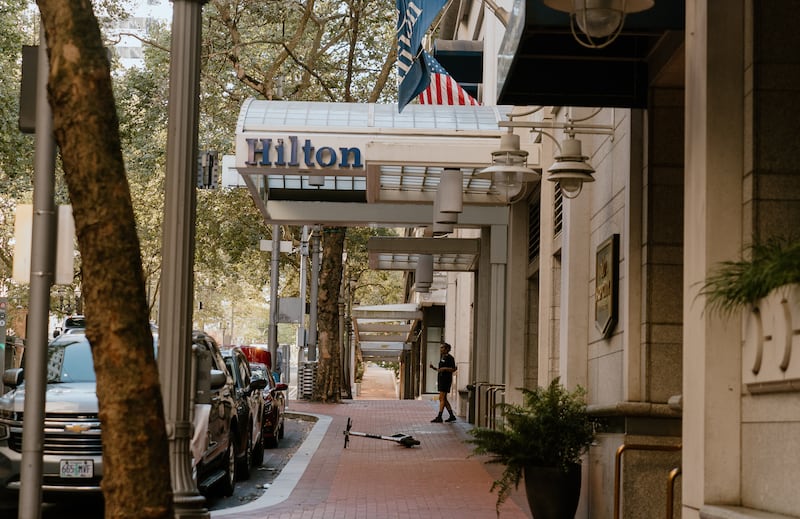In an era when people can work from anywhere, few choose downtown Portland.
That’s clear from a July study by ECONorthwest, not yet finalized, which shows that on any given day, there are 55% fewer workers downtown than there were before the pandemic. In the same report, consultants estimated it would take until 2034 for office vacancy in downtown Portland to drop below 10%—the ideal range.
One consequence of a hollowed-out downtown: fewer bookings at the city’s top hotels. Last week, wweek.com reported that the swanky Benson Hotel in downtown Portland complained of losing a corporate client that booked 300 rooms a month.
Now WW has learned that three high-end hotels in the downtown core—including the city’s flagship Hilton—are in foreclosure proceedings with the banks that issued their mortgages.
Such proceedings are the first signal that the emptiness of downtown Portland has reached a critical stage.
Property owners are irate. Greg Goodman, whose company owns a patchwork of properties downtown, calls the vacancy rate “a full-fledged disaster” and says city leaders “are doing nothing about it.”
Yet most corporations with downtown offices are not requiring workers to return.
Portland General Electric’s 900 downtown employees can work remotely if they choose. So can the 1,900 Standard Insurance workers who once populated two enormous buildings downtown, and 600 NW Natural employees.
Environmental consulting firm ClearResult recently downsized from 60,000 square feet in a waterfront office building at 101 SW Main St. to a 5,000-square-feet conference room in the same building, telling WW it is “leading by example for other businesses looking to reduce their environmental impact.”
According to the latest estimates, office vacancy downtown is at 26%. But the real number may be much greater.
David Squire, executive vice president of the real estate brokerage Newmark, estimates there’s a much larger share of office space that’s still leased but unused. He says those spaces will show up in vacancy figures when five- and 10-year leases expire in the next two years.
“You’ve got vacancy, and frankly, a more important number to focus on has to do with the office utilization,” Squire says. “It’s much, much lower.”
Squire’s brokerage has a number of buildings that are 99% leased on paper but only 40% occupied. Many of those leases expire within 24 months. “This is a conversation that’s going across every company downtown,” he says.
Those numbers have city leaders sweating. Two weeks ago, WW reported that Mayor Ted Wheeler plans to bring an ordinance to the Portland City Council that would waive one-time charges for developers who agree to convert office buildings to reasonably priced apartments for a minimum of 15 years.
But experts say those charges are a mere drop in the bucket of what it costs to convert office to residential space.
Squire says the mayor must do a lot more if he wants to spur conversions.
“It can’t be done without some city assistance. The numbers just don’t work,” Squire says. “The glut of office space has been coming for years. Has Portland stubbed its toe? Absolutely.”
An exodus of lessees from downtown office spaces places building owners in an impossible bind: reinvest more capital to refinance the loan and stick it out or enter foreclosure and give the keys to the bank.
And if there’s one industry that is giving a taste of what’s to come for office buildings, it’s Portland’s downtown hotels.
Last week, WW reported that the Benson had lost two large clients due to downtown conditions, per an email written by a top Benson executive and obtained by WW. “Too many homeless and crazy people running around. Suffice to say, I’m furious!” the executive wrote.
An examination of court and property records by WW found three hotels have reached a more alarming stage than the Benson: The banks holding their mortgages are preparing to foreclose.
Nathan Sasaki, owner of Apex Real Estate Partners, says their fates show the consequences of a derelict downtown.
“If we don’t do something with downtown, there will be an amazing amount of properties that will go into foreclosure,” Sasaki says. “We haven’t even started to feel the pain yet. The banks are trying to keep these properties off the foreclosure list, because why would you want to take something back that you know is a bloody mess? But eventually they have to.”

The Portland Hilton and Duniway Hotel
921 SW 6th Ave. and 545 SW Taylor St.
The Portland Hilton and its partner building Duniway have 782 rooms combined; together, they constitute the biggest hotel in the city. The Hilton has 21 conference rooms and rises 22 stories. The Duniway underwent a massive renovation just five years ago and renamed itself after pioneering newspaper editor Abigail Scott Duniway. It boasts a double-decker cocktail bar and a balcony of lawn games on the 11th floor.
But both are about to be auctioned by the bank that holds their mortgages.
The 22-story Portland Hilton was built in 1962. The neighboring 20-story Duniway was built in 2002. The hotel is owned by an institutional investor—meaning an entity that pools money to invest in assets.
In 2020, a judge put both hotels under a receivership because of missed mortgage payments to the bank. (A receiver is a neutral third party that comes in to run the business and its finances in an effort to dig it out of financial hardship.)
Property records obtained by WW show the bank will put the two properties up for sale Sept. 13 at a courthouse auction.
Owners of the building owe more than $270 million to the bank, according to records. Those same documents offered a peek at how things went down the day the lender served notice of sale on the building. “Server spoke with the manager on duty at the Hilton Hotel. He refused to give his name.”
Dossier Hotel
750 SW Alder St.
The lenders of the Dossier entered nonjudicial foreclosure proceedings earlier this year after the owner of the building failed to make mortgage payments between March 2021 and May of this year, according to property records.
The building itself was first erected in 1999 but, after a massive renovation, reopened as the Dossier in 2017. The hotel is adorned with local art, and chandeliers hang in its event ballroom. Patrons are offered discounts to Knot Springs, which the hotel touts as the “city’s social wellness club.”
According to records, the property will be put up for auction Nov. 29 “on the front steps inside the main entrance to the Multnomah County Courthouse.” Records show the owner of the building owed the lender $8.7 million, as of May.
Provenance Hotels, parent company of the affiliate that owns the Dossier, was formerly owned by Gordon Sondland. A Texas company recently bought out Provenance this summer. Sondland now sits on the board of the parent company.
Update, 9 pm Wednesday: After press deadline, Provenance Hotels responded to inquiries from WW, saying it had “reached an agreement with LNR Partners on loan modification terms and is in the process of closing the deal, which will bring the loan current. There will be no foreclosure of the property.” That deal is not yet finalized, and the foreclosure proceedings remain ongoing for now.
“We have been attempting to resolve this issue with LNR Partners for two years and have always had the funding to bring the loan current,” a Provenance representative said in a statement. “We look forward to putting this matter behind us.”
WW had contact Provenance Hotels for comment prior to publication but did not hear back.
Correction: A previous version of this story said the Duniway was built in 1962. In fact, the Duniway was built in 2002. WW regrets the error.

